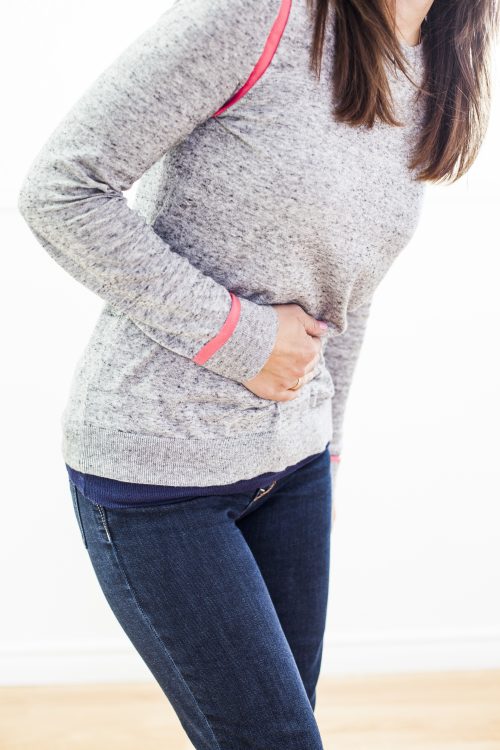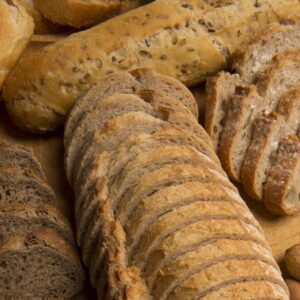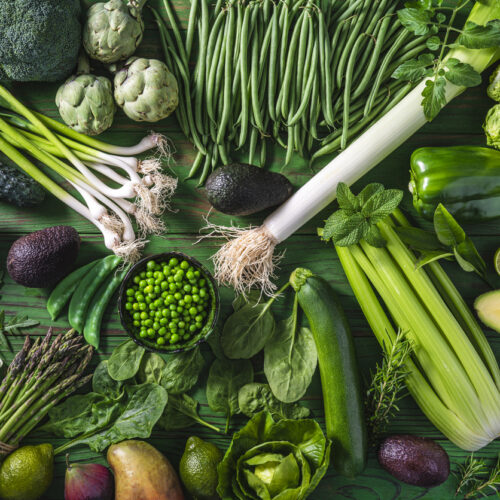
Dietitian Katrina Pace investigates what causes constipation and how to find relief from this common digestive problem.
Constipation is more than just an inconvenience or discomfort, says dietitian Katrina Pace. It can affect all areas of your life. Studies have shown that being constipated can contribute to anxiety and depression and, in older people, can lead to social isolation.
When Emily sat down with me she was almost in tears. “I would just feel so much better if I could, you know, ‘go’ more often!” She felt her bowel habits had ruled her life for years. Physically, she felt daily pain and bloating. Mentally, she felt anxious and depressed. She couldn’t wear her favourite clothes because of the bloating and she was on a constant lookout for toilet stops, just in case.
The thing is we’re not used to talking about our bowel habits. By the time we seek help, like Emily, we’re often in a really bad state. Sometimes we need to just bite the bullet and talk poo. Or a lack of it. Constipation, that is.
What’s the problem?
Constipation is diagnosed when you have to strain to open your bowels, have hard or lumpy stools at least 25 per cent of the time, or have a bowel movement less than three times a week. Perhaps you have been to the toilet but feel there is still more to come (incomplete evacuation), or that there is still a blockage. Or perhaps loose stools are only achievable by taking laxatives.
It is important to make sure you’re not affected by an underlying bowel condition that could cause the constipation.
What is normal?
Fibre, bacteria, digestive products, water and other undigested food matter are what make up our stools. Water is drawn into our bowels to help soften these waste products so they can be removed easily from the body. When the waste products have accumulated in the lower bowel (rectum), the pressure triggers a need to ‘go’.
There is no ‘normal’ when talking about bowel movements. For one person normal may be going once a day, for another it may be three times a day. As long as opening your bowels doesn’t cause discomfort, pain, the need to strain, or the sensation of not being able to empty your bowels fully, then you are generally okay!
You may have seen pictures of different stool types on the Bristol Stool Chart. Hard lumpy pellets are generally described as resulting from constipation. A copy of the chart can be found at healthyfood.com, under ‘Resources’.
Why does constipation happen?
Sudden changes to your diet such as having more or less fibre, going paleo, low carb, gluten free or vegetarian, or even just going overseas on holiday and eating different food, can affect how your bowels work. As fibre is one of the main ingredients of stools, and is food for another main ingredient, gut bacteria, rapid changes in the amount of fibre you eat can also change the frequency and bulk of your stools.
Fibre also draws water into the bowel to soften the waste products. So eating more fibre but not drinking more water can cause your stools to harden and become more difficult to pass.
Other lifestyle reasons for constipation include not drinking enough, not exercising, sitting for long periods, or taking medications such as antidepressants, diuretics or anti-epileptics, or iron or calcium supplements.
The most common medical causes of constipation are obstruction of the bowel, nerve damage, nutrient deficiency caused by chronic disease, hormonal changes and gastrointestinal disorders. Often, in these cases, the constipation is a side effect of the medical condition. If constipation is chronic — in other words, if it goes on for more than three months with minimal or no relief — then it is worth having a medical check-up. Tests your doctor may recommend include blood tests, X-rays (to check how full your bowels are), a colonoscopy (where a camera takes pictures of the inside of your bowel to check for polyps, inflammation, diverticulitis, or other causes of constipation), or colon motility studies (where specialists observe how long it takes for a capsule to pass all the way through your digestive system).
Finding the road to relief: What can help?
1. Nutrition
- If you have made recent changes to your diet and notice you have become constipated, then it is worth backtracking. Make dietary changes slowly over a number of weeks.
- If you cut back on carbohydrates, make sure you get plenty of fibre from vegetables, fruits, nuts and seeds.
- Introduce beans and pulses slowly.
- Consume a variety of fibre from whole grains, nuts, seeds, grains, vegetables and fruit. Don’t forget the skins, pips and seeds of veges and fruits.
- Try having some kiwifruit. Enzymes, fibre and vitamin C are all found in kiwifruit and can help relieve constipation.
- Several small studies have shown that ground flaxseed can help treat constipation. Start with one teaspoon daily.
- Studies have shown that of all bowel problems a low-FODMAP diet is least likely to help constipation, but may help with bloating and pain.
- Try a probiotic.
2. Exercise
Although published research sits on the fence on this topic the results of two recent studies suggest that exercise can help facilitate bowel motions. Exercise has also been seen to work in practice many times. Tightening the pelvic floor muscles, reducing stress and reduced colonic transit time seem to be a few ways in which exercise could help.
3. Hydration
Getting dehydrated in an air-conditioned office, or not drinking enough while exercising or as the weather gets cooler, means there is less fluid to be drawn into your bowels and keep the stools soft. Make sure you drink consistently throughout the day.
4. Toilet training
You would be amazed at how common it is to not use the toilet properly. Try these tips:
- Sit on the toilet in the morning, and within 30 minutes of eating a meal.
- If you feel the urge to go, make sure you go — don’t try to hold on until later.
- Don’t strain; relax and give yourself time.
- Sit for just five minutes.
You can also help by making sure you are sitting correctly on the toilet.
- Make sure your knees are higher than your hips. Put your feet on an old telephone book or shoe box if your knees are too low.
- Lean forward and put your elbows on your knees.
- Push out your tummy and make sure your back is straight.
- Relax — don’t strain.
What not to do
- Go unchecked by a doctor.
- Start using laxatives, enemas or colonic irrigation before being checked out.
- Suddenly consume a whole heap of fibre without enough fluid — you are best to make any dietary changes slowly.
- Be shy. It’s something we all do. If you can’t bring yourself to talk about it, then write it down and give it to your doctor.
Constipation – a normal part of getting old?
Some people think that becoming constipated is just a natural part of getting older. Although a third of us over 60 experience constipation, it is not necessarily something you have to live with. Constipation is likely to happen for the same reasons as it does in children, adults and older adults, but in those over 60 it can happen more often. The muscles in the bowels and the pelvic muscles can start to get weaker, affecting how often you open your bowels. Having a chronic disease or being on long-term medications, such as diuretics or pain medication, can also put you at increased risk of constipation.
Seniors keep it moving
- Get checked out sooner rather than later. It may be something as simple as a side effect of your medication, which could be changed. But as you get older it could also be something that needs medical investigation.
- Keep as active as you can. Constipation happens more as you slow down and stop moving. Even walking to the letter box once or twice a day will help cut the risk of constipation.
- Drink throughout the day. Try not to limit what you drink, even if you are on diuretics (fluid tablets). If waking during the night bothers you, drink more during the morning and early afternoon.
Constipation in kids
Constipation in kids can be difficult to diagnose. For babies in nappies it is easy to notice if they’re not having dirty nappies. Older children may complain of a sore or swollen tummy, or be reluctant to go to the toilet. Kids may have constipation for the same reasons as adults (not drinking enough, changes to diet, medication side effects), but it can also be a symptom of stress. A review of studies of over 3000 children found that stressful events could result in constipation.
How to support your child with constipation
- If it goes on for more than a few days, talk to your family doctor.
- Make sure your child isn’t stressed or anxious about going to the toilet. Are they worried about going to the toilet at school or kindy? Give them enough time and privacy at home to feel less anxious. Feeling anxious about pooing away from home is very common in kids, and adults too.
- Talk to them about when they last had a poo. Do they know what is going on? Many kids don’t know what constipation is and why it happens. They may not link tummy or bottom pain to not being able to go to the toilet.
What not to do
- Don’t ignore the constipation. Even just a few days can make your little one very uncomfortable. Talk to your doctor, Plunket, or call Healthline. Remember, children’s doctor visits are free. Never give a child laxatives or bulking treatments without first getting medical advice.
- Avoid suddenly giving your child a whole lot more fibre. You will just fill an already filled space. Make diet changes slowly and encourage the drinking of more fluids.
Article sources and references
- Basch E et al. 2007. Flax and flaxseed oil (Linum usitatissimum): a review by the Natural Standard Research Collaboration. Journal of the Society for Integrative Oncology 5:92—105https://www.ncbi.nlm.nih.gov/pubmed/17761128
- Chan AO. 2007. Increasing dietary fiber intake in terms of kiwifruit improves constipation in Chinese patients. World Journal of Gastroenterology 13:4771—5https://www.ncbi.nlm.nih.gov/pubmed/17729399
- Chang CC et al. 2010. Kiwifruit improves bowel function in patients with irritable bowel syndrome with constipation. Asia Pacific Journal of Clinical Nutrition 19:451—7https://www.ncbi.nlm.nih.gov/pubmed/21147704
- Cheng C et al. 2003. Coping strategies, illness perception, anxiety and depression of patients with idiopathic constipation: a population-based study. Alimentary Pharmacology & Therapeutics 18:319—26https://www.ncbi.nlm.nih.gov/pubmed/12895216
- Dimidi E et al. 2014. The effect of probiotics on functional constipation: a systematic review of randomised controlled trials. American Journal of Clinical Nutrition 100:1075—84https://www.ncbi.nlm.nih.gov/pubmed/25099542
- Drossman DA & Dumitrascu DL. 2006. Rome III: New standard for functional gastrointestinal disorders. Journal of Gastrointestinal and Liver Diseases 15:237—41https://www.ncbi.nlm.nih.gov/pubmed/17013448
- Gordon M et al. 2016. G38 (P) Probiotics for treatment of chronic constipation in children: A Cochrane systematic review. Archives of Disease in Childhood 101 (Suppl 1):A25https://adc.bmj.com/content/101/Suppl_1/A25.1
- Hanif Palla A & Gilani AH. 2015. Dual effectiveness of flaxseed in constipation and diarrhea: Possible mechanism. Journal of Ethnopharmacology 169:60—8https://www.ncbi.nlm.nih.gov/pubmed/25889554
- Ramos CI et al. 2015. The short-term effects of olive oil and flaxseed oil for the treatment of constipation in hemodialysis patients. Journal of Renal Nutrition 25:50—6https://www.ncbi.nlm.nih.gov/pubmed/25238699
- Rao SS et al. 2015. Systematic review: dietary fibre and FODMAP-restricted diet in the management of constipation and irritable bowel syndrome. Alimentary Pharmacology & Therapeutics 41:1256—70https://www.ncbi.nlm.nih.gov/pubmed/25903636
- Tan KY & Seow-Choen F. 2007. Fiber and colorectal diseases: Separating fact from fiction. World Journal of Gastroenterology 13:4161—7https://www.ncbi.nlm.nih.gov/pmc/articles/PMC4250613/
www.healthyfood.com










